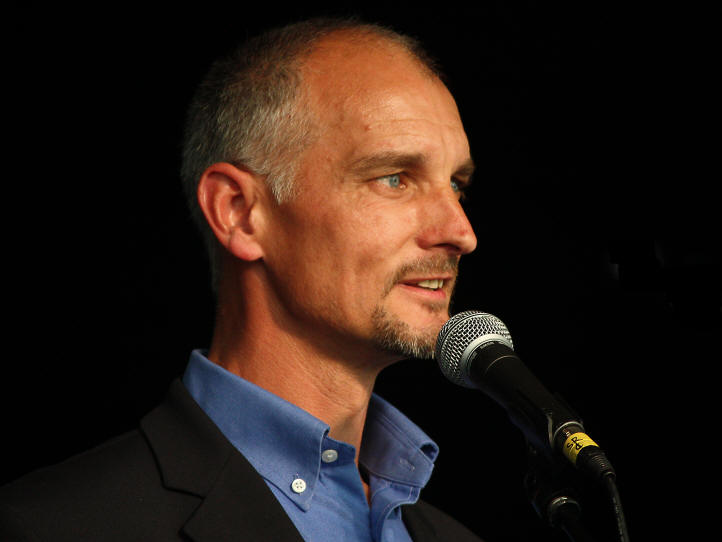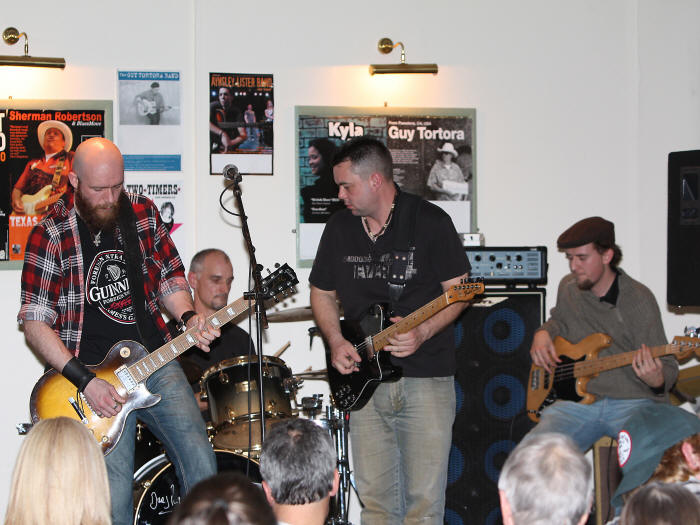
Painting © 2004 Loz
Arkle
Website
© Copyright 2000-2011 Alan White - All
Rights Reserved
Site optimised for Microsoft Internet Explorer
Early Blues Interview
|
|
Alan: Where do you come from and where did you grow up? Mark: I was born in St Helens but I grew up in a small town called Prescott. Alan: Did you come from a musical family? Mark: My brother was quite musical, he was a guitarist and he played in a Liverpool-based band called Black. 'Wonderful Life', was a hit that they had, or something like that. He introduced me to the heavier metal scene because he used to listen to Led Zeppelin, Black Sabbath and I just sort of picked up his taste really. My older brother was a big Motown fan so that music was always rattling round the house. Alan: Did you always want to become a musician or be involved in the music business? Mark: In hindsight I would have loved to have been earlier but I didn’t come to music until quite late. Obviously I listened to the radio, I’ve always gone to see live bands at big stadiums and theatres or even small pubs locally. Knocking around with bikers and the bikers scene you have a tendency to go and see the heavy metal groups so I got involved that way as a spectator but not as a player. I came to drumming very late in life. Alan: You play in a band, tell me about them and where did you first meet? Mark: The first band I had was Stealer, that was created around 1996 and it was following a climbing accident. I used to go to Monroes Bar Workington and I was on their mailshot and I got a mailshot shortly after the accident which coincided with the guy in Carlisle who did all the surgery on me saying that I needed to get more movement in my foot and if I didn’t he would bring me back in and put a bolt in it so there would be no sideways movement. So the flier said, “Come and Learn to Play the Bass Drum or Guitar at a Class on Saturday morning” So I started drumming with a guy called Dave Thompson who ran the class at the time and he showed me the rudiments. Something clicked and I really liked it so I begged, borrowed and stole bits of drum kit to make up a full kit and then we had a jam session in 1996 in The Grey Goat Cockermouth. There were five of us and we named ourselves shortly after that after watching a band called The Score who dedicated a song to me called “Stealer”. Since then I've been involved with a band called “The Answer", a West Cumbria based band and we opened Maryport Blues Festival 2005. With Stealer we played Colne Great British R&B Festival on the British Stage, then at Burnley Blues Festival in the Lesser Mechanics as it was then, and obviously the circuit around Maryport since the start of the Festival when Hugh Beverton and Paul Sherwin first put it all together.
Alan: You now MC both the Maryport and Carlisle Blues Festivals, how did you first get involved in being the 'Master of Ceremonies' at such great festivals? Mark: I was 'sand-bagged', literally! We opened the show in 2005 when the marquee was down on the harbour side and shortly after it was bandied around if I would be interested in MC-ing. At the time I was just marshalling and helping backstage and I said, "Well, let me do some other stuff first" because they did have guest MCs and I did the Battle of Bands Competition and the Summer Beer Festival. We provided the gear for Sean Webster to do a Xmas gig for the Festival Committee and Sandra Walling asked me if I’d be interested in fronting the festival. I said, “Well, I’m not sure really because I love playing on the circuit and at the festivals but let me think about it, and when do you need to know by?” “Before you put your drums away tonight” she said. I spoke to different people and they said “It’d be a great opportunity, even if you only do it once” so I did it, got a good reaction and enjoyed it. There’s a fair bit of research, and a lot of pressure but you get to stand in the wings and watch. It might seem like you get to rub shoulders with the rich and famous but you don’t, you’re just a helper, another volunteer, but it’s nice to watch at close quarters people you've heard on the radio and CD. Alan: How do you prepare for MC-ing a three day festival with so many artists to introduce? Mark: I liaise very closely with the festival organiser, we have meetings, we get to host some of the local radio shows as guests. You’ve got to do some reading on the internet if you don’t know the artist but when you’ve followed somebody for years like John Amor or Robert Cray you don’t need to do as much as the research is ingrained. But when you don’t know somebody very well, the sleeve notes on CDs are useful or their websites. You just need to cherry pick and go for areas of interest so that people might think, “Oh, that’s a nice fact, I didn't know that”. But sometimes I don’t get it right! I’ve had a couple of cock-ups with pronunciation. I had Dana Fuchs .... there have been quite a few. You do get heckled and harassed but it’s all part and parcel of it. I love doing the MC-ing and I love helping on the stage as I'm a drum technician. It’s good being close to the bands and you get all sorts of snippets of information such as what they’re working on, who they’ve been touring with, what their plans are. Managers or agents won’t necessarily tell you, but artists do. That insider knowledge is superb, it makes it fresh and it doesn’t make it look like you’ve just taken it off the website. Working with the artists as a drummer you create that little bit of a contact and it’s surprising how many artists turn up with different bands. The drummer who worked with Paul Carrack and who worked with Ian Anderson, then there's Alex Reeves, the drummer who works with Paddy Milner and Marcus Bonfanti; a great drummer. These people who do all these other things with other bands to pay the bills. So, MC-ing is a privileged position and it's a great honour to do it. Alan: Given the number and wide range of artists you've introduced, you must have some interesting moments to tell? Mark: You see an artist in a totally different light. For example did you see the Paul Carrack documentary? Now what you see is what you get, Paul Carrack is just like he was on TV as he is in the wings and on the stage. He gets nervous before he goes on just like everyone else, he’s a kind man, smiling eyes and just wants to be part of the group. There are others who brush you aside, won’t give you eye contact and it can be quite demeaning because you are there to help, you arn't there to pry, you are there as a volunteer and sometimes I don't think they understand this. Not all the artists seem to realise that without the volunteers these events aren’t going to happen, whether they are young bands on the way up looking for somewhere to play or the old guys on the way down who are falling off the rockface but looking to keep earning the rent. For an anecdote, there are so many, personally, it's the people who recognise what you're doing; Paul Carrack was one of those who thanked everybody. For me, I remember Booker T Jones, whose had a phenomenal career. At the end of the night when all the sound crew were gathered together winding down he made a deliberate effort to come out into the midst of us all and said “I would like to thank you all for your efforts this evening and he went round to each and every one of us and shook our hands. It was so personal, so human. I do find generally the older artists are far more gracious. Alan: Thank you very much Mark and see you at Carlisle. Mark: Yes, just tap me on the shoulder and we'll have a couple of pints......!!!! _________________________________________________________________________
Return to
Blues Interviews List |









